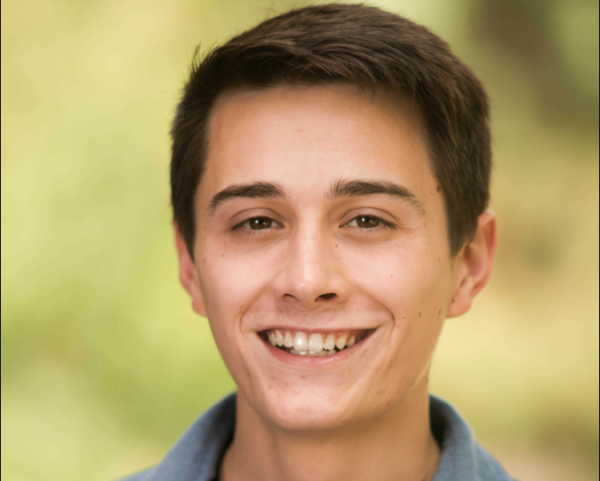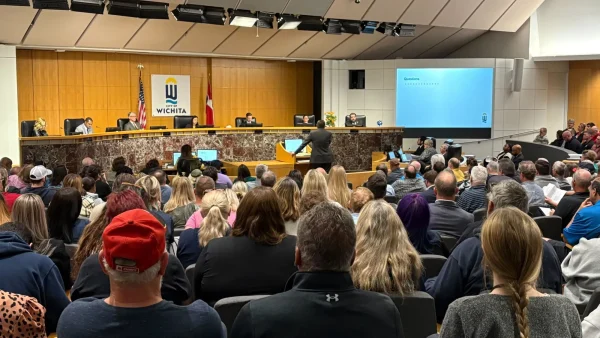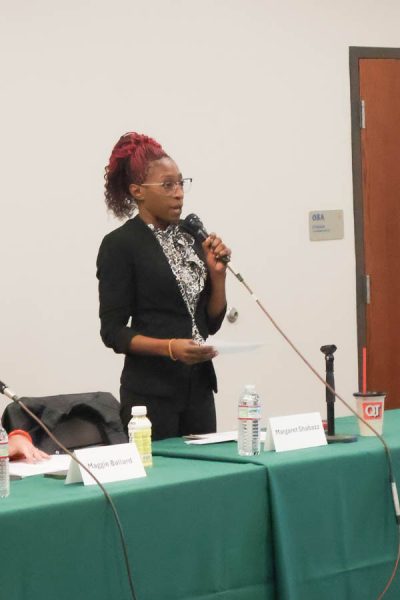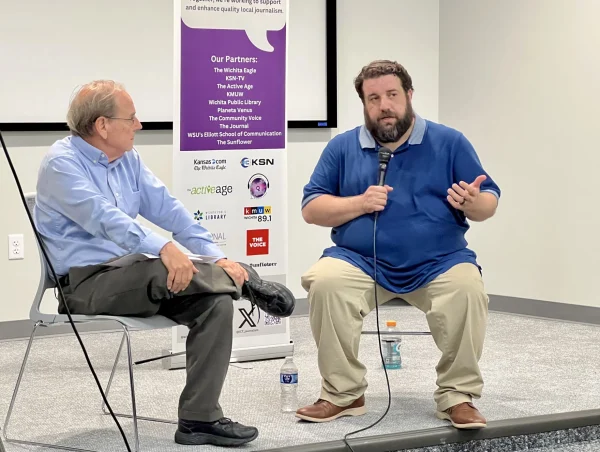Candidate for WSU liberal arts and sciences dean: ‘There’s an eclipse of attention to liberal arts’
Robert Matz, interim dean of the college of humanities and social sciences at George Mason University in Fairfax, Virginia, gives a presentation at Wichita State. Matz is one of the finalists for dean of the WSU college of liberal arts and sciences.
Robert Matz, one of four candidates for dean of the Fairmount College of Liberal Arts and Sciences, presented to Wichita State faculty and staff members as part of the dean search committee’s selection process. The chosen candidate will replace current dean Ron Matson, who is retiring after 48 years at WSU.
Matz used his presentation to emphasize that his experience as interim dean of the college of humanities and social sciences at George Mason University, a role he’s held since October, gives him the expertise needed for the role at WSU. Matz stressed that WSU is “very much like George Mason.”
Matz, whose expertise is in renaissance literature, has worked in academic administration for 15 years, he said Monday. He directed the English department at George Mason University for five years, then served as chair of the department for five years. He held the role of senior associate dean from 2013 until taking on the role of interim dean.
“Both schools see themselves as drivers of the regional economy, and even more as developers of local talent,” Matz said. “There are funding challenges, enrollment challenges. I see both the opportunity and the challenges as a good fit for me.”
George Mason doesn’t allow interim deans to apply for the dean position they’re filling, so Matz said he decided to look for a full dean position elsewhere.
“I’ve learned this stuff, so I might as well do something with it,” Matz said.
Matz talked about seven goals he’d set as dean, to be achieved by 2023. They included enrollment, innovative approaches to liberal arts, transformative student experiences, retention, diversity, community and research, of which he said “the sum is greater than the parts.”
LAS will “increase enrollments across all areas by 2023,” Matz said, but without a proposed number or percentage of growth. “I thought that would be premature.”
He said WSU reflects the national trend of enrollment being down from its peak in the 90s.
“I understand from my conversations today that the enrollment here is on the way up, but still, numbers are down from where they were in 1990.”
LAS also deserves more attention by the university, Matz said.
“There’s an eclipse of attention to liberal arts. It’s bad for us as a society to only think about STEM (science, technology, engineering, math), which is often what happens now.”
The faculty and staff in attendance were prompted to write their perceptions of Matz, for consideration by the dean search committee.
Five questions were asked by the 40 or so staff and faculty in attendance during the Q&A portion of Matz’s presentation, with no more than one hand going up at a time and pauses in between questions.
The first question, from a staff member in the philosophy department, was about administrators nationwide being “less than courageous” in the face of “targeted harassment” towards “faculty that say things that are pro-LGBTQ or pro-Islamic.
“It’s a national thing,” the staff member said. “I don’t know about any personal cases here, but this is Kansas. Can you say something about that?”
Matz talked about President Trump’s travel ban and George Mason’s president’s office issuing a “wonderful statement” to faculty, staff and students in response. “That was important for our community to hear,” Matz said. WSU President John Bardo’s office sent out a similar statement after the ban.
When asked about the best practices for recruitment, Matz said “you can never say what pays off.” He went on to say that websites have to be accurate, attractive and engaging. His presentation was accompanied by a PowerPoint presentation with more than one typo.
When asked about budget cuts, Matz said he oversaw a $2 million budget in the English department, and “helped generate around $3 million to my unit through examination of my budget” while serving in his associate dean position. He said he’d provide specifics if necessary, but nobody asked for further detail.
After the presentation, faculty and staff handed in their notes to the dean search committee representatives. Two faculty members were quick to quietly comment — “He seemed nervous, huh?” Matz spent over a quarter of his presentation time looking down at his notes.
As the attendees filed out, with two faculty members approaching Matz for a quick word, Matz was asked what he’d like to tell the readers of the WSU student newspaper. He said he thinks “there are a lot of exciting possibilities” at WSU.
“I’m excited about the prospect of serving as dean here. The other thing is, I really like to talk to people, and I really like student involvement, so I’d hope to have more conversations with students, as well.”

Andrew Linnabary was the 2018-2019 Digital Managing Editor of The Sunflower. He studied journalism and minored in English. Linnabary is from Wichita, Kansas.












